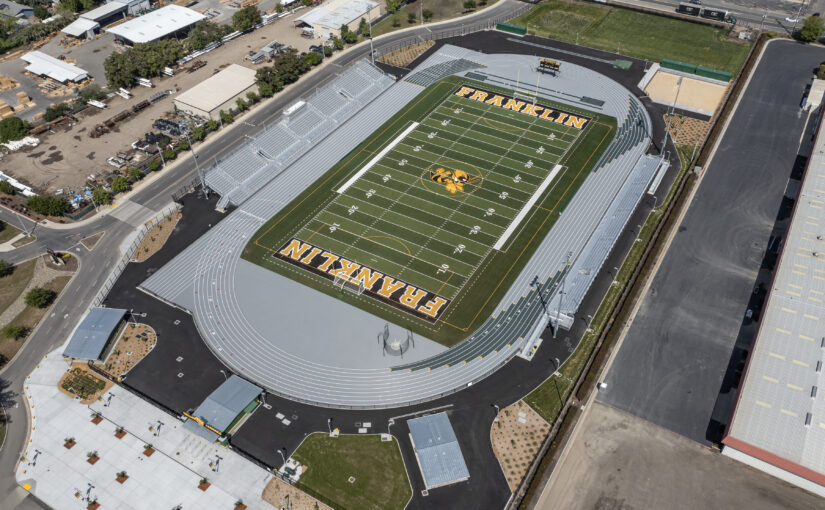Sacramento State Pressing Billionaire To Pay $9 Million In Pledges
“Due to the recent economic downturn, I have not pressed Mr. Spanos on his pledge payments to the Alex G. Spanos Sports Complex at Sacramento State, knowing that his intention was to fulfill the pledge,” school president Alexander Gonzalez wrote to Natalia Orfanos, director of communications at the A.G. Spanos Companies, in a Jan. 16, 2009, letter.
But, Gonzalez added, despite talks to set up an easier payment schedule, “a follow-up by my staff has not yielded a new agreement.”
Gonzalez even invited Orfanos and other executives to the Sac State campus, then wrote, “If you are unable to travel during this difficult time, I would be more than happy to visit you in Stockton.”
Now, seven years after the 2004 pledge, only $1 million of the money has arrived and fully $9 million remains outstanding, several sources told Capitol Weekly. However, the school continues to use the Spano’s name in relation to the sports complex. School officials did not answer a question emailed on Oct. 3 asking if they would consider removing Spanos name if he doesn’t make good.
Kevin Wehr, an associate professor of Sociology and the president of the Capitol chapter of the California Faculty Association, confirmed that according to people he has spoken with, $9 million is the correct figure for the amount of the pledge that remains to be paid.
“I have heard about this from somebody who is in a position to know, and that is the figure I have heard,” Wehr said.
Sources said Gonzalez and other top officials became increasingly worried about the missing pledge money as the years passed and Spanos’ health declined. The wealthy owner of the San Diego Chargers NFL franchise turned 88 on Sept. 28. At the end of 2008, there was a flurry of media reports after the Spanos family confirmed that he was suffering from dementia.
The university declined to release a copy of the original agreement between Gonzalez and Spanos. Sources told Capitol Weekly it consisted of a single line that said, in effect: “I pledge $10 million to go to the Spanos Sports Complex at Sacramento State over 10 years.”
The 2009 letter from Gonzalez and the university’s public acknowledgement that most of the pledge has not come in, suggests that the original agreement lacked legally-binding language.
When asked two weeks ago about the missing pledge, Orfanos characterized it as “a donation, not a debt.” She also appeared to dismiss the notion that the media should be asking them about the money.
“You should respect the spirit that people give money,” Orfanos said. “They give it because they want to.”
Orfanos did not return a call this week seeking further comment.
“Our agreements with donors to the university are confidential,” said Gonzalez in a statement sent to Capitol Weekly.
“We guarantee this confidentiality so we can encourage future donors to provide support for student scholarships, academic programs and projects that enhance our University. Alex Spanos is one of Sacramento State’s strongest supporters. For instance, the university was able to host the U.S. Olympic Track & Field Trials in 2000 and 2004 as a result of his gifts.”
Between 1998 and 2003, Spanos gave $1.5 million to renovate the school’s track facilities for those events. A July 2004 profile in the Sacramento Bee called Spanos an “Olympic-size donor.”
According to sources, one option considered by fundraising officials was to credit the $1.5 million amount towards the $10 million pledge, allowing Spanos to more easily fulfill the terms of the latter.
Gonzalez added: “Mr. Spanos is living up to his gift agreement, and because of his generosity, and his ability to inspire other donors, Sacramento State continues to raise funds that are helping us accomplish many of our campus goals.”
Gonzalez and university spokeswoman Kimberly Nava declined to elaborate on what is meant by “living up to his gift agreement.”
School officials cited legal code that allows them to withhold a record “if its release would jeopardize or compromise the security or integrity of the original record” or if “access is otherwise restricted by statute.”
“We have every confidence that our gift agreement with Mr. Spanos will be fulfilled,” Nava said. Earlier, she said that “providing copies of these agreements would have a chilling effect on future donations to the university.”
Despite Sacramento State’s reluctance to discuss details of the stymied pledge sought, the school has touted his generosity in the media. The $10 million amount has figured prominently in news stories.
Gonzalez took the reins at Sacramento State in 2003, after serving six years as president of Cal State San Marcos. Prior to that he spent six years as provost at Fresno State, where he acquired a reputation for cultivating donors.
Fresno State also has been probably the most athletically-successful of the CSU schools. Its football team has a “giant-killer” reputation for beating schools from more glamorous conferences, the baseball team won the 2008 College World Series, and the women’s basketball team is an NCAA tournament regular.
It’s a model Gonzalez reportedly wanted to mimic at Sacramento State, as part of a larger goal of raising the profile of the school. In early 2004, Gonzalez launched an effort called Destination 2010.
According to material on the school’s website, “The Alex G. Spanos Sports and Recreation Complex is an ambitious project that will change the face and character of Sacramento State. It is a centerpiece of Destination 2010, an initiative to transform the campus into a premier metropolitan university and a destination campus.”
Like all CSU campuses, Sacramento State suffers from severe budget cuts in recent years. In a publicly-available letter sent to Gonzalez in April of last year, University Budget Advisory Committee chairman Fred Baldini reported that the school’s budget deficit was a whopping $25.2 million. Baldini went on to recommend numerous cuts, including $460,000 from the athletic department.
Our Sept. 29 story prompted a discussion on Sac Buzz, a discussion website focused on Sacramento State athletics, with one contributor wondering if Spanos might lose the naming rights. The school did not respond to a question emailed to them on Oct. 3 asking if they would consider taking Spanos’ name off the complex if he did not satisfy his pledge.
Spanos is on the annual Forbes listing of the 400 richest Americans, coming in at No. 375 with a net worth of $1.1 billion.
The Spanos family is a major political contributor. During the 2004 presidential campaign, Alex Spanos gave $5 million to Progress for America, a group that worked against Democratic nominee John Kerry, and later pushed for causes including Social Security privatization.
OpenSecrets.org, which tracks political spending, reported on Oct. 7 that players and executive donations make the Chargers the second-most politically active organization in the NFL, giving “$171,500 to federal politicians and committees since January 2009.”
The A.G. Spanos Companies have also been extremely active political donors in California. This includes $299,000 in the 2009-10 cycle. The top item was a $100,000 donation in 2009 from Alex Spanos himself to Budget Reform Now, a group supporting a pair of unsuccessful budget initiatives proposed by then-governor Arnold Schwarzenegger, followed by $97,000 to group fighting Stockton’s anti-growth ordinance.
But the big money came between 2003 and 2006, when the Spanos companies, family members and affiliated entities gave a whopping $9.7 million total in political donations in California — ironically, almost the same amount Spanos pledged to Sacramento State during that same period. This includes $5.65 million to the California Republican Party, and $2.25 million Schwarzenegger’s California Recovery Team. In 2003, Spanos put in $200,000 for Schwarzenegger’s Total Recall committee.







